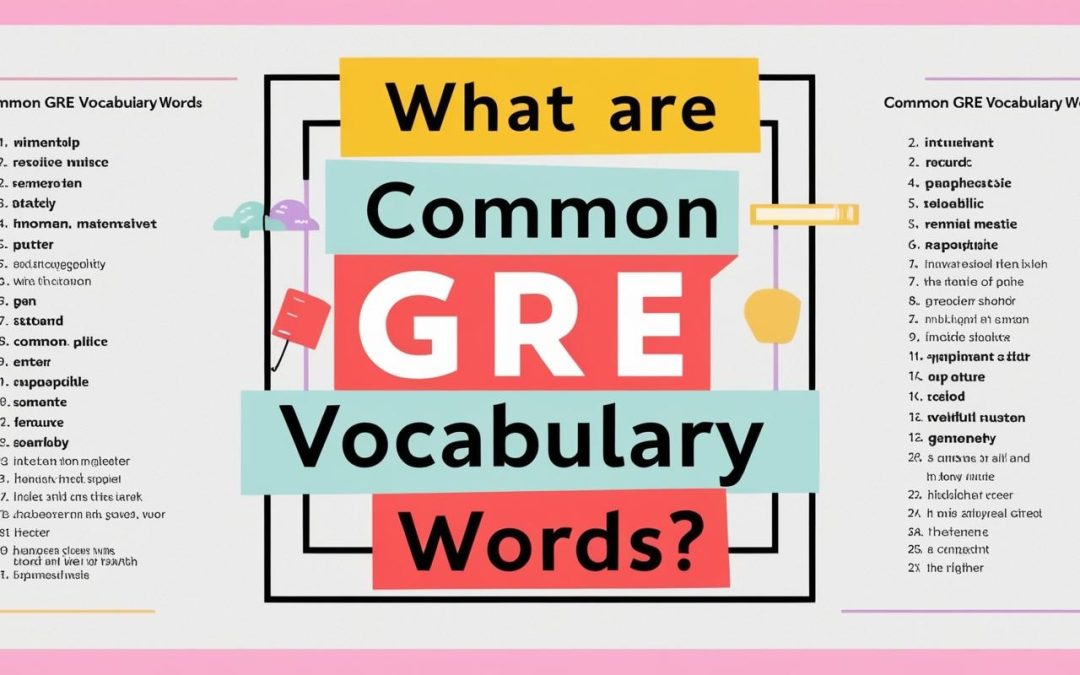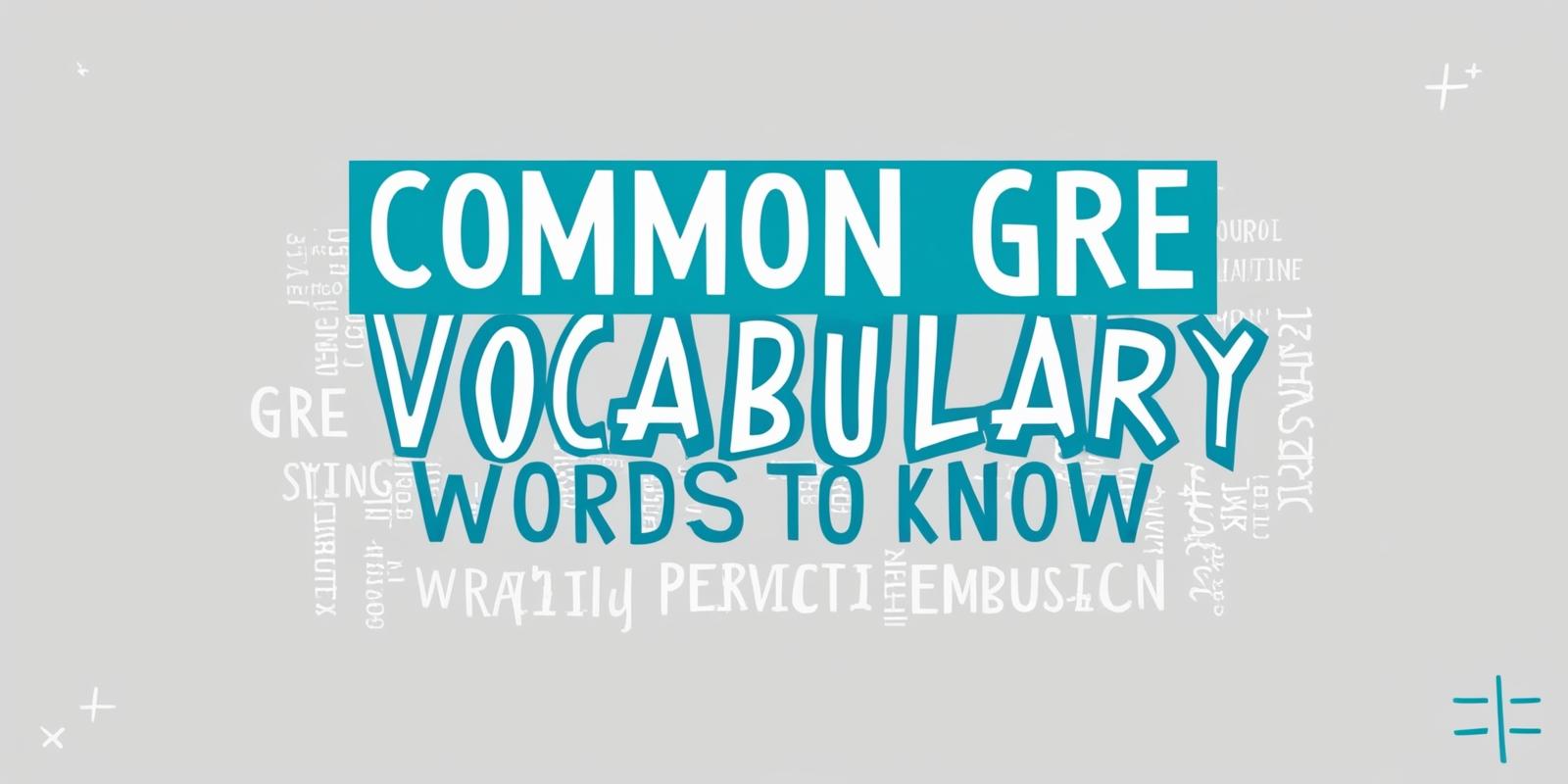Preparing for the GRE can be both exciting and overwhelming. With so much to focus on from math problems to reading comprehension it's easy to overlook the importance of mastering the vocabulary that often appears in the verbal reasoning section. But don’t worry, we’ve got your back. Here at TakeMyGREExam.com, we’re dedicated to helping you excel by providing the most comprehensive and helpful list of common GRE vocabulary words. The GRE is all about strategy, and one of the best strategies you can use is strengthening your vocabulary. Why? Because vocabulary questions are a significant part of the test and can really make a difference in your overall score. But with so many words to remember, where do you even begin? That’s where we come in. We’ve made it easy for you by gathering the most common GRE vocabulary words, offering useful tips, and providing practice resources to ensure you're fully prepared for test day. Read on to explore some of the most frequently tested GRE words and discover how we can help you master them.
Why GRE Vocabulary Matters
The GRE is designed to assess your readiness for graduate-level studies. While math and analytical writing are crucial, the verbal reasoning section evaluates your ability to understand and analyze written material. And vocabulary plays a huge role in this.
In this section, you'll encounter questions that test your understanding of words in context, your ability to identify meanings, and your skill in using these words appropriately. The better your vocabulary, the easier it will be to tackle these questions with confidence.
At TakeMyGREExam.com, we focus on the words that matter most – those that appear time and time again in GRE questions. By memorizing these words, you can drastically improve your chances of acing the verbal reasoning section!
Common GRE Vocabulary Words to Know
While no one can predict the exact words that will appear on your test, some vocabulary words are so commonly tested that they’re almost guaranteed to show up. Here’s a quick list of some essential words you’ll likely encounter:
-
Abate – to reduce or lessen
-
Adulate – to praise excessively
-
Apathy – lack of interest or emotion
-
Capricious – unpredictable or whimsical
-
Cacophony – harsh, discordant sound
-
Ebullient – enthusiastic and full of energy
-
Equivocate – to use ambiguous language to conceal the truth
-
Exacerbate – to worsen or intensify
-
Laconic – using few words; concise
-
Obfuscate – to deliberately confuse or obscure
These are just a few examples. The full list of common GRE words is extensive, and with a bit of practice, you’ll become familiar with them in no time. The key is consistent exposure and repetition.
How TakeMyGREExam.com Can Help
At TakeMyGREExam.com, we understand the struggle of trying to learn hundreds of vocabulary words while balancing other aspects of your GRE preparation. That’s why we’ve created a range of tools and resources to help you study smarter, not harder.
-
Flashcards: Our interactive flashcards are an easy and fun way to quiz yourself on GRE vocabulary words. With our digital flashcards, you can practice on the go, ensuring you're always reviewing even when you’re short on time.
-
Word Lists: We’ve curated comprehensive word lists based on frequency and difficulty, so you can focus on words that are most likely to appear on the GRE. You won’t waste time studying obscure words that hardly ever come up!
-
Practice Tests: We offer practice tests that include vocabulary questions, giving you a real sense of what to expect on test day. By practicing with realistic GRE questions, you can boost your confidence and refine your test-taking strategy.
-
Study Guides: Our expertly crafted study guides break down GRE vocabulary into manageable sections. Whether you want to study by theme or difficulty, we’ve got you covered.
-
Tips and Tricks: Our blog and resources section is packed with helpful advice, including how to learn vocabulary efficiently, mnemonic devices, and techniques to remember difficult words.
Tips for Mastering GRE Vocabulary
Mastering GRE vocabulary doesn’t have to be a daunting task. Here are some tips to make your vocabulary study more effective:
-
Practice Consistently: It’s better to study a little every day rather than cramming all at once. This will help you retain the words over time.
-
Use the Words in Context: The GRE often tests how well you understand a word’s meaning in context. Try to read sample sentences and practice using the words in your own sentences.
-
Group Words by Theme: Instead of memorizing words randomly, try grouping them by theme (e.g., words that describe emotions, actions, or quantities). This will help your brain make connections between words.
-
Create Mnemonics: Associating a word with an image or a story can make it easier to remember. For example, think of a "capricious" person as someone who's always changing their mind, like a capricious weather pattern.
-
Stay Positive: Learning GRE vocabulary can feel overwhelming, but with the right attitude, it can also be rewarding. Celebrate small victories and keep pushing forward.
Frequently Asked Questions (FAQs)
1. How many vocabulary words should I learn for the GRE?
There's no exact number, but focusing on the most frequently tested words is key. Aim for a solid foundation of 300-500 high-frequency GRE words.
2. How long should I study GRE vocabulary each day?
Ideally, you should dedicate 15-30 minutes each day to vocabulary practice. This will allow you to make consistent progress without feeling burned out.
3. Can I learn GRE vocabulary the night before the test?
While last-minute cramming is never ideal, reviewing a list of common words before the exam can be helpful. Just remember, vocabulary mastery takes time and effort!
4. How can I remember all these words?
Using flashcards, mnemonic devices, and contextual practice will help you retain the vocabulary more effectively. Repetition is your friend!
5. Is it worth it to focus on GRE vocabulary?
Absolutely! A strong vocabulary can give you an edge in the verbal reasoning section, which is crucial for achieving a competitive GRE score.
Ready to Boost Your GRE Vocabulary?
At TakeMyGREExam.com, we’re committed to making your GRE prep journey as smooth and effective as possible. With our expert resources and friendly guidance, you’ll be well on your way to mastering GRE vocabulary and achieving the score you need to unlock your graduate school dreams.
Don’t let vocabulary questions hold you back start building your GRE word bank today. We’re here to help every step of the way.


